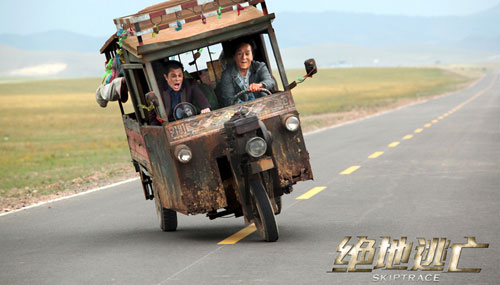Entertainment
How to Tap Into China's Blockbuster Film Industry
By Daisy Lin

China’s film industry is growing fast – how can Hollywood players get in on the action?
Movie ticket sales in China reached nearly $5 billion last year, and Chinese filmmakers have ambitions of becoming global purveyors of films. A flurry of big deals between Chinese and U.S. media companies have recently come down the pike: Paramount Pictures, Warner Bros. Entertainment Inc., Lions Gate Entertainment Corp., STX Entertainment have all made deals with Chinese companies to the tune of billions, and more deals are in the works as China's growing film industry tries to ramp up production.
"There's a genuine drive and need for Chinese companies to expand beyond China," said Jeffrey Chan, chief operating officer of Bona Film Group Ltd., which announced at the Shanghai International Film Festival that it plans to produce 26 films during the next 18 months.
Veteran producers and financiers who have been working in the Chinese film industry for years said the opportunities for U.S. filmmakers are there if you know where to look, but China differs from Hollywood in key ways.
1) Your idea must intrinsically appeal to the Chinese market
The holy grail of co-production is to find the right story that works both inside China and outside it, but for now that is likely an unrealistic expectation, according to Ellen Eliasoph, president and CEO of Village Roadshow Entertainment Group Asia, who has produced a string of hit films in Greater China. She said the film must have intrinsic cultural and commercial value to the Chinese market – it's not enough just to have a token Chinese character in your film – so filmmakers can't just attempt to impose their creative vision onto the Chinese market. "The best way for someone who's a foreigner that wants to do business in China [to succeed] is to listen to what the Chinese industry is telling us," she said.
David Linde – founder and CEO of Lava Bear Films and one of the executive producers of "Crouching Tiger, Hidden Dragon," and "Hero" – said that if you have an idea that is intrinsically of interest to the Chinese, the next step is to think about how to expand that idea to "create something that could not only perform well in China, but can actually perform all over the world."
Linde said that American filmmakers could be involved in helping to find stories with universal appeal and "finding ideas that are truly global."

"Meet with Chinese filmmakers and see what they're working on to see if there's a way to collaborate and develop a project that way."
Right now, many eyes are on "The Great Wall" – a big event-style movie starring Matt Damon, Willem Dafoe and Hong Kong star Andy Lau, and directed by Zhang Yimou, the famed Chinese director of "Hero." The film is scheduled to be released in 2016. The upcoming Jackie Chan feature, "Skiptrace," brings together the East and the West by pairing actor and comedian Johnny Knoxville with acclaimed Chinese actress and pop singer Fan Bingbing.
When it comes to ideas, a lot can be lost in translation, but certain genres seem to translate more easily than others. Romantic comedy, for example, is becoming a popular genre in China, and Chan is working with Fox International Productions on a remake of "Bride Wars," the 2009 comedy that originally starred Kate Hudson and Anne Hathaway as two brides-to-be trying to one-up each other when their weddings are booked on the same day. The remake will feature Chinese stars and a Chinese director.
2) It all starts with distribution
China is a very big market, but access to that market is very specific and defined. Only a few entities have access to distribution in China, the most important one being the China Film Group Corp., which is tied to SARFT, the State Administration of Radio, Film, and Television.
"That's the key, is your movie distributable in China?" said Bennett Pozil, executive vice president and head of corporate banking at East West Bank, which is based in the United States and has a license to do business in China. The bank helped to finance two big China-Hollywood partnerships this year: STX's deal with Huayi Brothers Media Corp., and Lionsgate's co-investment with Hunan TV.
"So when we started back in 2011, knowing that we're going to lend in RMB [Renminbi], our mission was to find Chinese-language product, through the Chinese distribution system, so we actually made a list of eight names, and as of this year, we're in business with all eight of those companies," Pozil said.
Pozil advises filmmakers to find a partner who already has success in China. He checks the trade papers every week to see what the top films in China are, and who distributes those films. "You look at those names, that's who you want to do business with."
3) A need for technical talent
The quick ramp-up of film production means there is a shortage of technical expertise and a demand for foreign crews to work on Chinese films. Many Chinese producers are bringing in foreign Directors of Photography, assistant directors, production designers, editors, action choreographers and composers to help them make better movies.
"That's really where the sweet spot is," Eliasoph said, adding that some of her most successful collaborations have involved working with Chinese filmmakers to bring in foreign writers, not for the substance, but for the technique of writing.
"We can't tell them what their story is and... what the dialogue [is], [but] we can talk to them about the structure, how it's going to be written, do you want to set it up as a franchise, how can you set it up for sequels?" Eliasoph said.

She advises American filmmakers to visit China. "Meet with Chinese filmmakers and see what they're working on to see if there's a way to collaborate and develop a project that way," Eliasoph said.
4) New media opportunities
Another area of opportunity is in new media, where Chinese media companies have huge influence. Official statistics show that by mid-2014, there were 439 million people in Mainland China consuming video content on the Internet. The big Chinese Internet companies are expanding horizontally into the streaming space: Alibaba Group Holding Ltd. just kicked off a pay-to-watch video subscription service in September called Tmall Box Office, which is the equivalent of HBO and Netflix in China. Among its rivals is iQIYI, which recently announced that it now has more than 5 million paid-for subscribers to its VOD system.
"In China right now, there's a lot of exploration with short product that's being made directly for the Internet. And in fact, some of them have also spawned into big feature movies," Pozil said.
Linde says the China film landscape is a bit like the Wild West right now, which could mean new opportunities may be developing on the horizon. "You can go into the theatrical market, then very quickly go into the ancillary markets, and that creates amazing potential for all of us," Linde said.
Read more stories related to China film and entertainment.
Sign up for the Reach Further Newsletter
We’ll keep you in the know about the latest US-Asia business news and trends.
Suscríbase al boletín Reach Further
Lo mantendremos informado sobre las últimas noticias y tendencias comerciales entre Estados Unidos y China.

